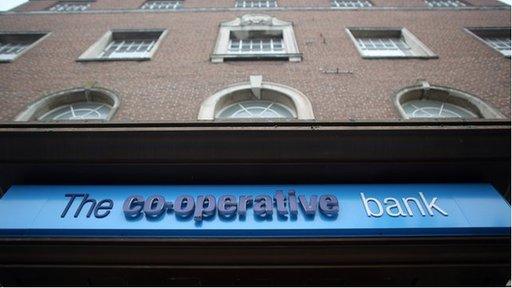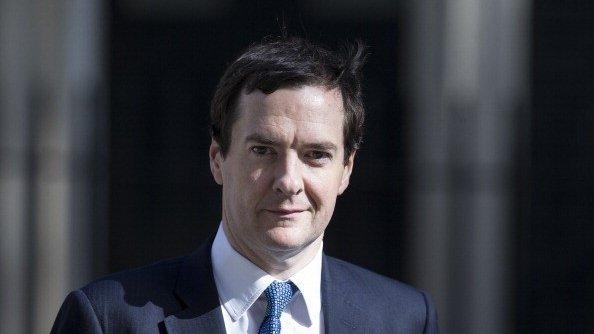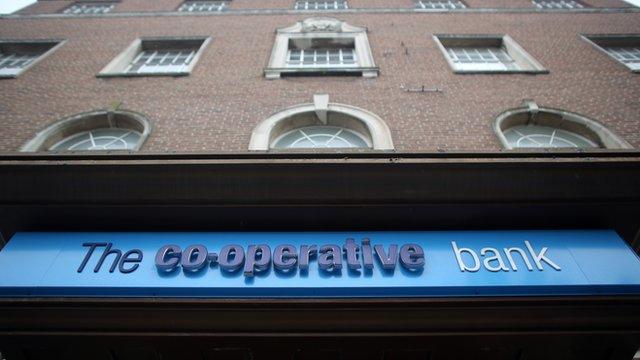Co-op report criticises KPMG and regulator
- Published

Co-op unveiled a £1.5bn capital shortfall after its bid to buy up Lloyds branches was called off
KPMG and the financial regulator have been criticised in a report by MPs into Co-op Bank's failed bid to buy 632 Lloyds branches last year.
The Treasury Committee said the black hole in Co-op Bank's finances which halted the deal should have been discovered sooner.
"Each of the backstops - Co-op Bank itself, KPMG as its auditor and the FSA as its regulator - failed to uncover the bank's capital shortfall," it said.
KPMG said its audits had been "robust".
The report by the Treasury Committee said it had found no sign of political meddling in the deal to sell the Lloyds branches - nicknamed Project Verde.
Lord Levene, former chair of banking shell NBNK which was competing with Co-op to buy the Lloyds branches, had alleged that the Treasury had pushed Lloyds to choose the Co-op Bank as preferred bidder.
'Totally inadequate'
Co-op announced plans to bid for the branches in 2011, but withdrew its offer in April last year, blaming the "economic environment" and "increasing regulatory requirements on the financial services sector".
It was later found to have a capital shortfall of £1.5bn.
MPs said this late discovery of the shortfall meant the opportunity to create a "significant new challenger" in the UK retail banking market had been "scuppered".
The black hole in the Co-op's finances has been largely linked to losses on commercial property loans, stemming from Co-op Bank's 2009 merger with Britannia, the building society.
MPs said the due diligence on the Britannia deal was "totally inadequate".
Their report said KPMG's initial due diligence was based on incomplete information, but said further work, which KPMG had recommended, was done by Co-op Bank itself and was "cursory and limited".
"KPMG should have given clear guidance to Co-op Bank about the standard required," it said.
The accountancy profession regulator, the Financial Reporting Council, is also conducting an inquiry into the auditing of Co-op Bank's accounts.
The Treasury Committee said this inquiry needed to "find out how something so important came to be overlooked".
'Accident waiting to happen'
"This may need to consider not only the work by KPMG but also the merits of the audit process for banks," it added.
It also said the "role and apparent shortcomings" of the now-defunct Financial Services Authority (FSA) should be examined in the current independent inquiry being conducted by the Treasury.
KPMG said as the Co-op Bank's former auditor it had provided "robust audits which challenged the judgements and disclosures proposed by the bank's management".
"It is understandable that there should be appropriate regulatory scrutiny of the financial issues at the Co-op Bank and it is to be expected that this scrutiny should extend to the audit," it said.
It added that it was "not responsible for guiding further due diligence undertaken by the Co-op Bank [on the Britannia deal] nor had a responsibility to scrutinise the results once complete".
The Treasury Committee was also scathing of the Co-op Bank's board make-up and governance saying it was "entirely inadequate" and "an accident waiting to happen".
"Co-op Bank's governance structure was not fit for purpose for any bank, let alone one bidding to become a major challenger in the UK market," it said.
- Published20 October 2014
- Published21 August 2014

- Published25 November 2013

- Published23 November 2013

- Published4 September 2013
